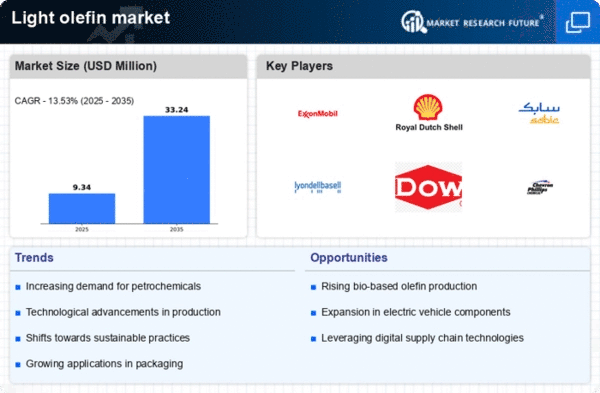Market Trends
Key Emerging Trends in the Light olefin market
The primary culprit behind environmental pollution is the utilization of petroleum-based feedstock. In response to this environmental challenge, there is a prevailing trend towards innovation in converting biomass into bio-ethylene, fostering the production of eco-friendly products. Notably, corn and sugarcane stand out as major sources for the raw materials involved in the production of bio-fuel, marking a shift towards more sustainable and renewable resources.
Countries like Brazil and India are at the forefront of this innovation, capitalizing on the abundance of cost-effective biomass. These nations are strategically focusing on the development of bio-fuel, particularly for automotive applications, as they recognize the potential of bio-ethylene to bring about positive environmental changes. The availability of inexpensive biomass in these regions amplifies the feasibility and economic viability of transitioning towards eco-friendly alternatives.
The conversion of biomass into bio-ethylene represents a significant step towards achieving environmental sustainability. One of the key advantages of bio-ethylene lies in its potential to reduce dependence on traditional chemicals derived from petroleum. By embracing bio-ethylene, industries can make substantial strides in reducing their reliance on non-renewable resources, thereby contributing to a more sustainable and eco-conscious production process.
Moreover, the adoption of bio-ethylene holds promise in addressing the pressing issue of greenhouse gas (GHG) emissions. As a renewable and plant-based alternative, bio-ethylene has the inherent capability to significantly curtail the environmental impact associated with traditional, petroleum-derived feedstock. This shift towards a greener and more sustainable production approach aligns with global efforts to mitigate climate change and promote environmentally responsible practices.
The ongoing shift from petroleum-based feedstock to bio-ethylene derived from biomass reflects a progressive response to environmental concerns. With corn and sugarcane serving as key contributors to the bio-fuel production process, and countries like Brazil and India leading the charge, the adoption of bio-ethylene emerges as a transformative force in the quest for eco-friendly alternatives. Beyond merely reducing dependence on chemicals, bio-ethylene's potential to diminish greenhouse gas emissions positions it as a pivotal component in the pursuit of a cleaner and more sustainable future.


















Leave a Comment